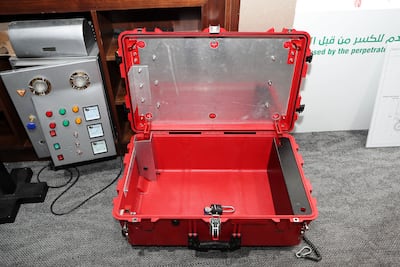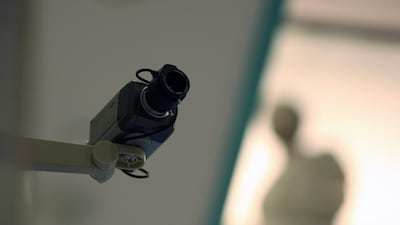Dubai Police have launched several new security projects to tackle crimes including theft and assault in residential and retail areas.
The projects use advanced technology and artificial intelligence to help streamline operations, save time and resources and enhance overall security in the emirate.
Tackling problem areas
Residential communities, construction sites, money transfer companies and Dubai's Gold Souk were all identified as being vulnerable to crime.
As a result of the new security projects, police reinforced security measures at Dubai's Gold Souk, including using break-resistance glass panels, impenetrable locks and mandatory iron doors.
The same locks were made obligatory in another project targeting warehouses.
“Currently 309 warehouses in Dubai adhere to these standards, contributing to zero recorded crimes in warehouses,” said Colonel Aref Ali Bishoh, Director of Dubai Police's Crime Prevention Department.
He said the projects aimed to combat crimes such as theft, assault and related offences.
“Through collaborative efforts with partners in these projects, all identified vulnerabilities were effectively addressed and resolved,” he said.
One project launched last year for residential complexes made it mandatory for developers to install measures including surveillance cameras linked to police control rooms and security patrols.
Increasing security for residents
Another project involves the force coordinating with relevant authorities and licensed companies to ensure that all gardeners are licensed and have valid working visas, with regulation of employment of gardeners who work informally at people's homes will be introduced in the next few months, said Col Aref.
“Companies will now issue uniforms for gardeners that make them identifiable in a way that encourages the public to seek their services instead of resorting to unlicensed individuals,” said Col Aref.

The Policeman Is Your Neighbour project, which launched four years ago, is also evolving to include civilian volunteers.
It will now allow members of the public to gather community information for police.
“This scheme was restricted to members of the police force and began with only nine officers. That number has now increased to 540.
“What's new is that we are opening the door for public members to join,” said Col Aref.
“Community engagement is crucial and security is a shared responsibility, not solely the domain of law enforcement.”
Tried and tested solutions
The new projects come as Dubai Police security schemes have recorded zero 'key' crimes, referring to theft and assault.
The Smart Home Project, which was launched last year, encourages homeowners to install sensors and cameras, as well as remote monitoring.
A total of 330 homes took part last year with another 450 homes this year, resulting in no recorded thefts.
It was also made mandatory for property developers to provide adequate lighting, trained security personnel, internal patrols and surveillance cameras linked to police control rooms.

Dubai Police joined forces with the municipality, the Department of Tourism and Economy, Civil Defence, and the Security Industry Regulatory Agency, to boost security for money transfer companies licensed to operate out of residential apartments.
“Weak security requirements at these units have made them targets for criminals,” said Col Aref.

“Therefore we established a joint task force that conducted on-site inspections, introduced a number of stronger security requirements and issued warnings to non-compliant apartments.”
The project introduced the use of advanced, tamper-proof bags equipped with an electronic system that connects them to the police.
“The bags require two keys to open, and are constructed from durable materials,” Col Aref said.
Projects to boost security at Du and Etisalat internet stations were also implemented after an increase in thefts involving cables, diesel and batteries.
Sensors and location technology tools were installed in 3,365 Du stations and 4,287 Etisalat stations.
“After implementing the enhanced security measures, an individual stole a battery from one of the stations. He was located and arrested within just 30 minutes,” said Col Aref.
In a similar scheme with Dubai Electricity and Water Authority, cable materials were changed from copper to aluminium in 4,000 stations across 43,000 stations.
“This contributed in zero cable theft crimes over the past three years.”
Other projects addressed vulnerabilities in unlit areas and unlicensed massage apartments.
“Five unlit areas are now provided with adequate lighting and more areas across Dubai will follow,” said Col Aref.
“A total of 120 unlicensed massage parlours were also shut down in the past two years.”


